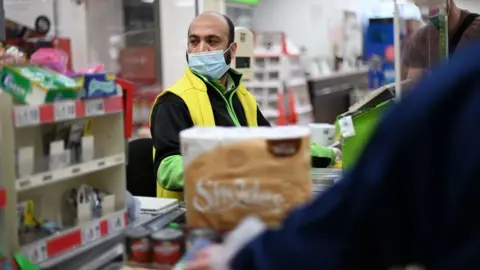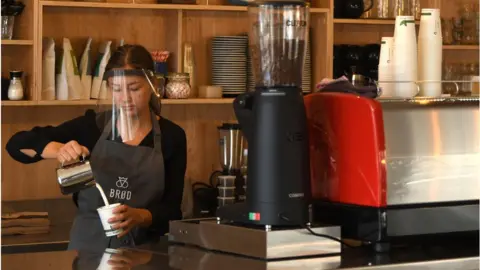Minimum wage rises for two million workers
 Getty Images
Getty ImagesAbout two million of the UK's lowest-paid workers will get a pay rise from Thursday as the minimum wage goes up.
The National Living Wage will rise 2.2% to £8.91, the equivalent of more than £345 a year for a full-time employee.
It will also be given to 23 and 24-year-olds for the first time, not just those aged 25 and over.
Statutory rates for apprentices and those aged between 18 and 22 will also rise, along with the voluntary "Real Living Wage".
However, hundreds of thousands of low-paid workers on furlough will see no uplift at all after they were excluded.
Ministers said the increases to minimum wages would particularly benefit workers in sectors such as retail, hospitality, cleaning and maintenance.
Prime Minister Boris Johnson said it would be "a welcome boost to families right across the UK".
Business Secretary Kwasi Kwarteng urged "all workers" to check their pay packets to ensure they were "getting what they are entitled to, and remind employers of their duty to pay the correct wage".

Minimum wage increases from 1 April:
- From £8.72 to £8.91 an hour for workers over the age of 23
- From £8.20 to £8.36 for those aged 21-22
- From £6.45 to £6.56 for 18 to 20-year-olds
- From £4.55 to £4.62 for under-18s
- From £4.15 to £4.30 for apprentices

The voluntary Real Living Wage will rise to £10.85 an hour in London and £9.50 outside the capital, but only a small minority of employers have signed up to pay it.
The foundation promoting it warned there was still a "substantial gap" between the statutory rates and one based on the actual cost of living.
Furloughed miss out
Much of the UK's retail and hospitality industries remain closed because of Covid, meaning many of the lowest-paid workers are on furlough and will miss out on a pay rise.
They will continue to get 80% of their usual income, based on pre-pandemic rates for the minimum wage.
About 800,000 of the lowest-paid workers were on furlough in February, according to the House of Commons Library.
The government said furloughed workers who returned to work after 1 April would move on to the new minimum wage rates for hours worked.
 Getty Images
Getty ImagesBut shadow chancellor Anneliese Dodds hit out at the "pay freeze" for furloughed workers.
"Hitting Britain's families in their pockets isn't just wrong - it's economically illiterate. If families have less money to spend, then businesses will suffer and the recovery will take longer," she said.
Frances O'Grady, general secretary of the Trades Union Congress, also said nobody should be expected to get by on less than the minimum wage.
"Low-paid workers on furlough have bills to pay like everyone else," she said.
"The government should guarantee that everybody will get at least the full rate of the minimum wage. And it should give all minimum wage workers a decent pay rise."
'Wiped out'
Mike Hawking of the Joseph Rowntree Foundation described the boost to the minimum wage as "necessary", but said that the pandemic had revealed the urgency of taking further steps to tackle in-work poverty.
"As we start to recover from the impact of the last year, too many workers are finding that minimum wage increases are being wiped out due to inadequate social security, insufficient hours available to them, and high housing costs."
Bryan Sanderson, chairman of the Low Pay Commission, which recommends the level at which the minimum wage should be set, said: "This week's increase is our first step towards the government's target of two-thirds of median earnings.
"It is a real-terms increase, meaning that an hour's work can buy more than it could last year at the start of the pandemic. The level of the new rate, however, also reflects the need to protect workers from job losses."
The commission said its best estimate for the National Living Wage rate in 2022 was £9.42, but this is subject to more uncertainty than usual and is likely to change.


This rise in the legal minimum wage will be welcome news, particularly as most households across the UK are also seeing their bills going up from the start of April. Planned price rises kick in for gas and electricity, council tax, water charges, the licence fee, TV and broadband rates, and NHS prescription charges in England. It'll be a stretch for many.
For those minimum wage staff who are on furlough at the moment, the news is even harder. Pay for those who would normally be working in bars, restaurants, hairdressers and hotels will continue to be based on 80% of their pre-Covid earnings.
They won't get the new pay rise until they start back to work again, but given the timetable on easing restrictions, many may be heading back to full employment soon.

